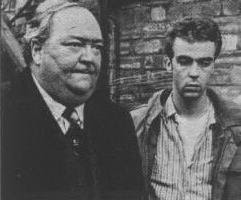My television viewing has been uneven over the years- I did not even own a set for several years in the 1990s - but here are my five choices in no particular order. You will see that I have interpreted "political drama" liberally.
Life on Mars
My most recent choice. It was telling that despite the sympathetic role given to John Simm it was Philip Glenister's Gene Hunt who emerged as the popular hero.
Could this be a recognition that today we concentrate upon codes of behaviour and language, whereas in the 1970s left-wing politicians saw progress as involving the material conditions of people's lives?
Maybe not, but it was a great series.
State of Play
I missed most of the final episode because I had done something terrible to the template of this blog, and they never quite succeeded in making the MP character as attractive as we were meant to find him.
Still, it was a superb cast and you can give Bill Nighy a lot of other performances for his starring role in this.
1990
I have written about this series before. Edward Woodward played a crusading journalist in a future dystopia. (Yes, I can remember when 1990 was the future.) There were two series, one shown in 1977 and one in 1978.
Interestingly, the dystopia had a socialist feel to it. This was born, no doubt, of disenchantment with the Labour government of the day. But the determination of the government in 1990 to bring in compulsory identity cards still felt thoroughly unEnglish.
Anthony Burgess's novel 1985, which was published in 1978, explored similar territory.
I, Claudius
This adaptation of Robert Graves' novels I, Claudius and Claudius the God enjoyed enormous popularity in 1976. It explained the operation of dynastic politics and starred just about every British actor of the period you have heard of, up to and including Christopher Biggins as Nero.
An honourable mention to another historical drama of the period, The Devil's Crown, which dealt with Henry II and his sons. It was just as good but is less well remembered.
Brond
In this 1987 drama a young John Hannah is out jogging in Glasgow. He stops on a bridge over the Clyde to get his breath back and talks to a small boy who is leaning over the parapet.
Stratford Johns, Britain's most famous TV policeman only a few years before, enters the frame. With one hand, and without breaking step, he tips the boy into river, winks at Hannah and the camera and walks out of the shot. It is the most outrageous opening to any television drama, ever.
 I remember the plot of Brond as being horribly complicated and involving Irish Republican and Scottish Nationalist terrorism. Brond himself, the character played by Johns, was a criminal mastermind with supernatural overtones.
I remember the plot of Brond as being horribly complicated and involving Irish Republican and Scottish Nationalist terrorism. Brond himself, the character played by Johns, was a criminal mastermind with supernatural overtones.Notes from the Geek Show quotes some of Brond's dialogue as he discusses an archetypal Scottish soldier:
He’s fought against Napoleon, and in the Crimea. In the last war he fought in the desert. In 1916 he fought on the dry plains of the Somme and drowned in its mud when winter came. Kenya, Korea –- he’s been there. He’s still in Ireland. And only last week he came back from a little group of islands in the South Atlantic. And every time he came home, he found things were worse that when he’s gone away – but he had never learned to fight for himself.The Marksman, a revenge tragedy set in the drugs trade of contemporary Liverpool, was another great drama from this year, but I am getting too far from politics.
1 comment:
Oh, yes, I, Claudius. Christopher Biggins was allegedly cast after appearing as the emperor whose thumb was made upwardly mobile by Carlsberg in one of the earliest "refreshes the parts other beers cannot reach" adverts.
My favourite bit was Augustus (Brian Blessed) booming "great stuff, Horace, not like the filth Ovid is writing these days".
Also, Sian Phillips later played the candidate's psycho-nutter ambitious mum in a stage version of The Manchurian Candidate. She apparently took the role before she learned that the character was modelled on Livia.
Post a Comment